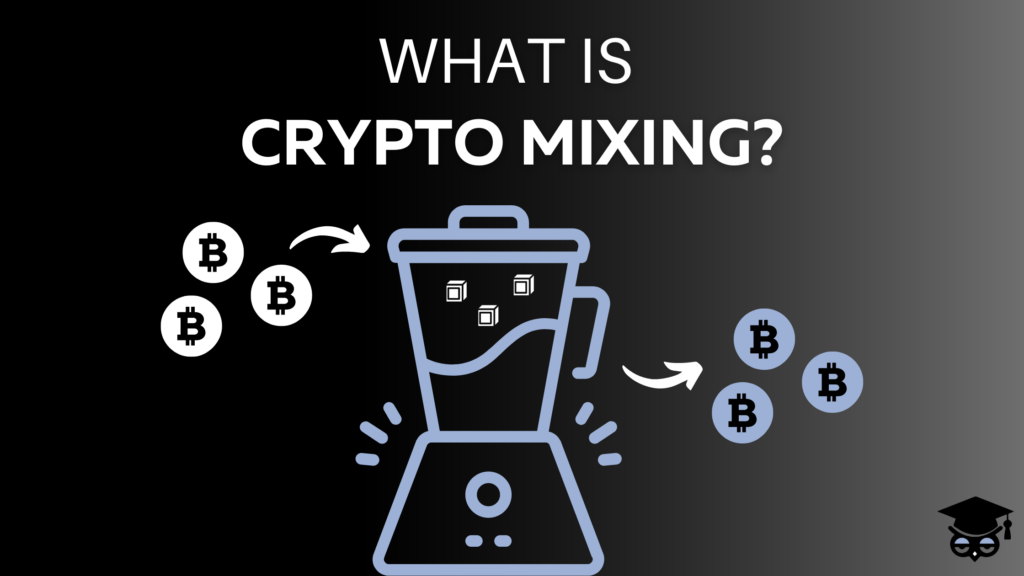What is a (Crypto) Mixer?
A (crypto) mixer is a service that allows users to anonymize cryptocurrency transfers.
The Long Definition
A crypto mixer is a platform used to keep crypto transactions private. It functions by pooling assets from different sources before mixing and sending them to their respective destinations. That way, it becomes hard for anyone to identify the specific source of funds in a particular address.

The Need For Mixers
One of the most talked about advantages of blockchain transactions is anonymity. It’s the idea that parties can complete transactions without having to reveal their identities.
Let’s say you’re sending 10 bitcoin (BTC). Anyone can view this transaction data via a blockchain explorer. This data includes your wallet address, the recipient’s address, and the amount in question. But while your real-world identities are hidden, there’s a slight problem.
You might complete anonymous transactions, but that doesn’t necessarily translate to privacy. Using a blockchain address, someone can view the complete path of a transaction. They can see how much crypto your wallet address is receiving or sending to or from certain addresses and at what time.
As a result, crypto transactions aren’t exactly private. This is what created the demand for mixers.
How Do Mixers Ensure Privacy?
Crypto mixers introduce privacy by taking transactions through a detour. Rather than send crypto directly to the recipient, you send it to the mixer. You then provide the recipient’s address as the withdrawal address. Some mixers even allow you to set the withdrawal period.
Note that you’re not the only one using the service. Ideally, there are many people also sending their crypto to the mixer. So, when the platform receives your assets, it mixes them with other assets from other users. This mixing makes it hard to trace the origin of the assets. Then after a while, the coins or tokens get sent to the recipient’s address.
That way, there is no clear line connecting you (the sender) to the recipient. If someone tries to track the transaction, they’ll be able to see you transferring crypto to the mixer. And because the crypto is mixed with that of other users, the trail ends there. The spy will be unable to tell who exactly the crypto went to.
At the same time, if someone is monitoring the recipient’s transaction, they’ll be unable to tell from whom the crypto came. Using a block explorer will lead the spy to the mixer. The mixer contains crypto from hundreds or even thousands of sources. This makes it nearly impossible to pinpoint the source.

Types of Mixers
Crypto mixers can be categorized as centralized or decentralized. Centralized mixers are privately owned services. You send the crypto to the mixer’s wallet address. They then mix it with their own assets and other users’ assets before sending it to the recipient.
By sending crypto to the mixer’s wallet, you’re essentially giving them custody of their crypto. This is the biggest criticism of centralized mixers. There is also a chance (although very small) that the platform will steal your funds.
Furthermore, you have to sign up for the platform to use it. This involves giving up KYC information, an act that may go against the whole point of seeking anonymity.
Decentralized mixers are not owned by anyone. They are permissionless platforms that can be accessed by anyone anywhere in the world. They work by pooling funds from different users in a smart contract. The smart contract then mixes the assets before releasing them to the recipients.
They don’t require users to complete KYC procedures. Therefore, they allow for the highest levels of anonymity.
Pros and Cons of Mixers
The only advantage of crypto mixers is privacy. By distorting the line between the sender and recipient, they make tracking transactions much more difficult. This makes them beneficial to users who want to be as private as possible.
On the flip side, this privacy is being exploited by criminals. There are people who use crypto mixers to launder money. For example, after hacking a platform, hackers typically pass the funds through a mixer. This is done in an attempt to throw authorities off their trail.
Also, crypto mixers charge a fee for their services. The charge can be as low as 0.3% or as high as 3% depending on the platform. Therefore, the transaction costs can be significantly higher than doing a direct transfer.

Are Crypto Mixers Illegal?
Crypto mixers in general are not illegal. In fact, they are classified as money transmitters by the Financial Crimes Enforcement Network (FinCEN). However, their association with money laundering has led to several shutdowns.
Recently, the US Treasury Department’s Office of Foreign Assets Control (OFAC) sanctioned Tornado Cash. This is because hackers (allegedly) used it to launder $7 billion in stolen crypto over three years.
However, just because criminals use crypto mixers doesn’t mean that everybody who uses a mixer is a criminal. Most people using mixers do so just because they value their privacy.
Want to join the Dypto journey? Follow our socials!